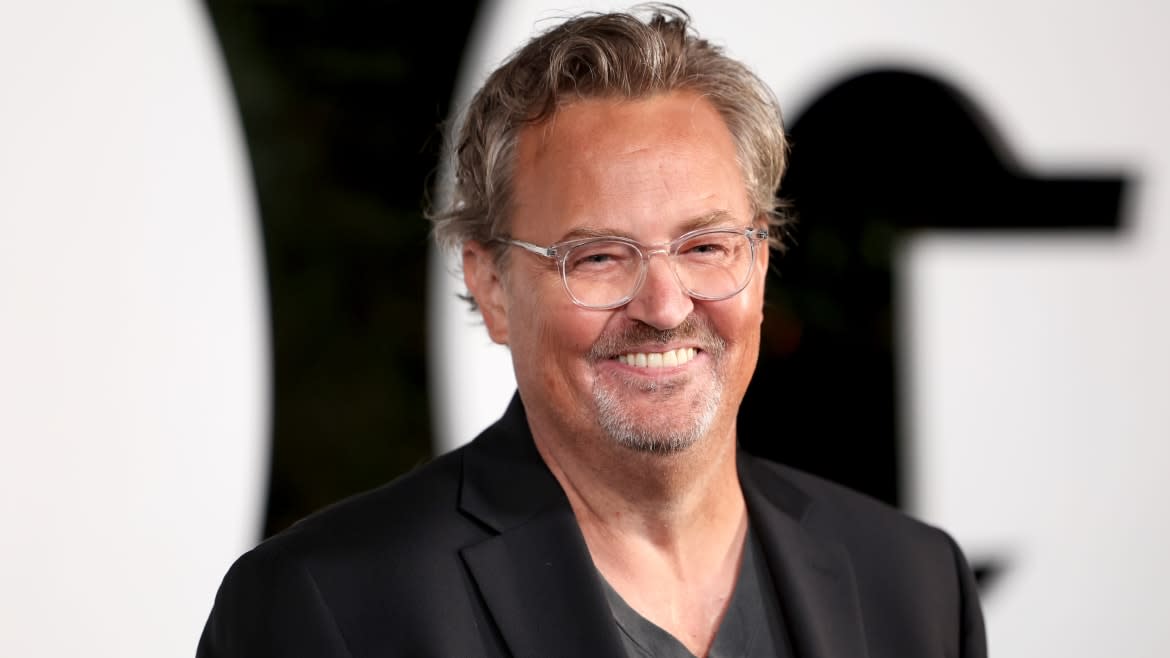Matthew Perry Wanted to Be Known for More Than ‘Friends’

Matthew Perry knew better than anyone that Friends would almost certainly define his legacy, but that didn’t stop him from dreaming bigger.
“The best thing about me, bar none, is if somebody comes up to me and says, I can't stop drinking; can you help me? I can say yes and follow up and do it,” Perry told podcaster Tom Powers while promoting his memoir, Friends, Lovers and the Big Terrible Thing, which debuted last year.
“That’s the best thing,” Perry continued. “And I’ve said this for a long time: When I die, I don't want Friends to be the first thing that’s mentioned. I want that to be the first thing that’s mentioned, and I’m going to live the rest of my life proving that.”
Friends certainly looms large over Perry’s legacy, but so, too, does the way he helped others. The actor was found dead in his Los Angeles home on Saturday at the age of 54, and since then, many of the tributes and appreciations written in his honor have focused on his unforgettable work on Friends. At the same time, his mission to help others has also made headlines—both his openness about his own struggles and the empathy he extended to friends in need.
Sad news, I was tuned into his journey.
Rest in peace Matthew Perry, dedicated to using the battle he was fighting with his own demons to help other’s 🕊️ pic.twitter.com/8TIMPhP097— Daniel O’Reilly (@dapperlaughs) October 29, 2023
In a recent video, Perry’s friend Hank Azaria recalled that he first met Perry when the future Friends star was just 16 years old while working on a pilot that never moved forward. The two became like brothers. “He just lived to laugh,” Azaria said. “He was like a genius... Most nights you spent with Matthew, you were crying laughing by the end.”
At the same time, Azaria acknowledged, “A lot of us who were close with him felt like we lost him to drugs and alcohol a long time ago, because as he documented in his autobiography, there was so much suffering.”
Azaria credited Perry with bringing him to his first Alcoholics Anonymous meeting, and he added that Perry “totally” helped him get sober. “As a sober person, he was so caring and giving and wise,” Azaria said. “... I really wish he could have found it in himself to stay with the sober life more consistently.”
Those who loved Perry and knew him personally “just missed him,” Azaria said. “We just missed him. It’s one of the terrible things about this disease, is it just takes away the person you love.”
Matthew Perry Gave a Masterclass in Sarcasm and the Sweetness of Humanity
Perry’s cause of death reportedly remains unconfirmed pending a toxicology report; the 911 call from Saturday, when Perry was found unresponsive in his jacuzzi, reportedly mentioned “drowning.” No illicit drugs were found in the home, although TMZ reports that prescription drugs were present.
In his book, Perry wrote at length (and in excruciating detail) about the damage his substance use disorder wreaked upon his life. He first became addicted to Vicodin after a jet ski accident in 1997, and in 2019, he spent two weeks in a coma and months in the hospital after his colon ruptured due to opioid use.
Perry also wrote in the book about how important it was to him to use his experiences to help others. He even created a sober-living facility for men in 2013, Perry House in Malibu, in a 5,500-square-foot home he’d previously inhabited. The actor also wrote about his trips to Washington, D.C. to push the efficacy of drug courts, which aim to decriminalize nonviolent drug offenders by offering them treatment instead of jail time. For some fans, these acts of empathy (and the book itself) will always be Perry’s most important contribution to the world.
‘Friends’ Co-Creators, Hollywood Stars Pay Tribute to Matthew Perry
On Saturday, Adele joined the swarm of fans honoring Perry online by praising him on stage in Las Vegas for being “so open with his struggles with addiction and sobriety, which I think is incredibly, incredibly brave.”
Speaking with the Los Angeles Times, William C. Moyers—vice president of public affairs for the national addiction treatment center Hazelden Betty Ford—said that Perry’s “willingness to share his story so publicly captured the reality that hope is real.”
As Moyers noted, Perry’s candor could have backfired. “There’s always a risk in having famous people share struggles with addiction, because most of us don’t live in that rare air,” he said. “But all of us can relate to the struggles families have, and we know this illness that does not discriminate whether you’re Matthew Perry or a homeless person seeking treatment at the Salvation Army. We all relate to the brutality of this illness, and that like the rest of us, he kept picking himself up, and he was a better man for it.”
Regardless of Perry’s cause of death, Moyer added, “he kept fighting and fell and got back up, and was never ashamed to share that truth.”
Perry might have worried that Friends would overshadow that courage, but based on fans’ remembrances, his honesty touched more people than he could’ve imagined.
Get the Daily Beast's biggest scoops and scandals delivered right to your inbox. Sign up now.
Stay informed and gain unlimited access to the Daily Beast's unmatched reporting. Subscribe now.


